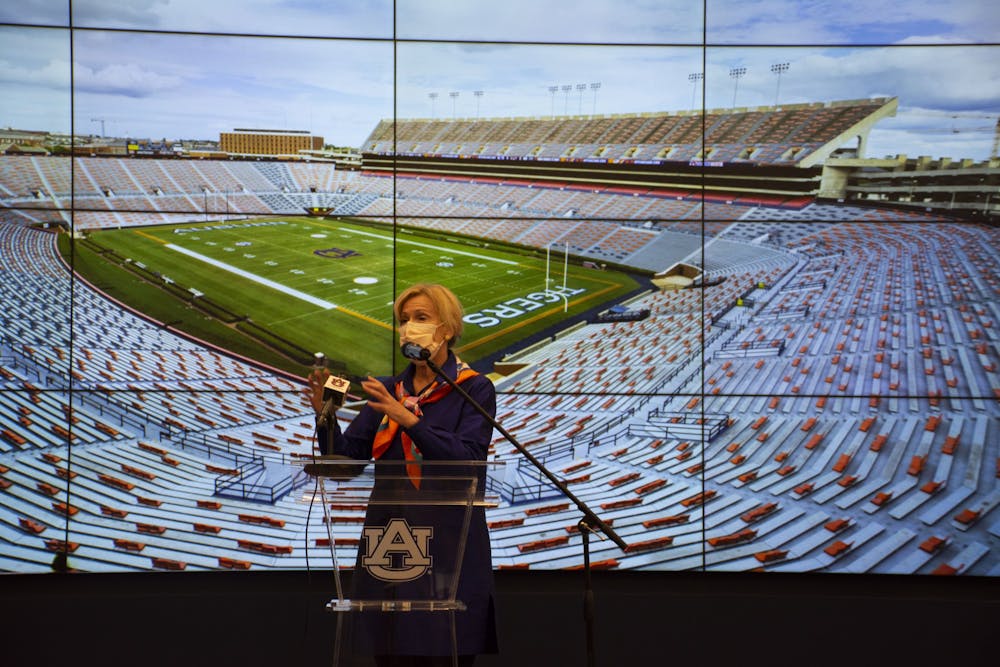Auburn University received a visit from Dr. Deborah Birx, the White House Coronavirus Response Coordinator, on Thursday afternoon. Birx had praise for the Southeastern Conference's response toward COVID-19 and optimism about Alabama's improving situation.
"I think when I was last here at the beginning of July, it was a very difficult time in general for Alabama," Birx said. "We saw nearly 95-100% of every county in Alabama, rural or urban that had more than 10% test positivity to COVID-19."
Birx met with Gov. Kay Ivey in Montgomery, Alabama, this morning before her visit to Auburn, whom she commended for implementation of actions like the statewide mask mandate. During that meeting, Birx said she and Ivey discussed how Southern states gave other areas of the country an idea about the implications of crowding indoors in public areas, as well as keeping actions like the mask mandate in effect through the fall.
"Gov. Ivey was one of the first governors to go out there with a mask mandate and make these really important changes at the state level," Birx said. "[She was] really asking everybody in Alabama to be together in this and really out of respect for one another to wear a mask and protect one another."
Alabama's Safer at Home Order, which includes the mask mandate, is set to expire on Oct. 2 as of writing, but Birx said the governor should declare another extension. Within two weeks after the introduction of the mask mandate, Birx said Alabama had a "dramatic decline in cases." Birx gave an example of Baton Rouge, Lousiana, which she said saw a decrease of COVID-19 positivity in wastewater two weeks after a mask mandate was introduced there.
"Alabama's test positivity [is] really dropping, really improving, but we've got to do even more," she said. "I think together we can see Montgomery continue to improve, the rural areas continue to improve and we really see the curves of the University the way we want to see the rest of the state."
Birx also thanked those who are practicing frequent handwashing and staying "physically [distanced] but socially connected."
"Most importantly, [thank you for] the work you've done to protect your family members and really decreasing those kinda gatherings we know throughout the South [that] created additional spread in households and neighborhoods," Birx said.
According to Birx, most of the state's counties are averaging 20-22% positivity rate down from 100% eight weeks earlier. She said SEC schools have made a strong collaborative effort especially in taking steps to mitigate the spread of COVID-19.
"I've really been impressed that competitive groups have come together united in a goal of protecting their students and making sure that the communities remain healthy," Birx said. "What has come out of this is one SEC – not an SEC of constant competition but an SEC of shared information across the schools over the summer."
Birx said SEC campuses like Auburn have taken an "integrated approach" receiving feedback from their faculty, staff and students, and allowing student athletes back over the summer was an important step in preparing for an altered fall semester.
Schools' COVID-19 dashboards have also allowed the public to stay well informed on virus numbers, Birx said.
"All the SEC schools are tracking well their symptomatic students and have very good testing for symptomatics in contact," she said.
Birx said one important facet of COVID-19 tracking universities should be aware of is surveillance monitoring, which encompasses tracking wastewater or performing routine tests. She said the Centers for Disease Control and Prevention is collaborating with SEC campuses and other institutions to ensure daily testing or testing every other day is available using data from surveillance monitoring.
"We were able from the University of Arizona to really learn about the work that they have done to correlate with those that are positive nucleic acid testing, what we call antigen testing and neutralizing antibody levels," she said. "They have good profiles of students and this is really important because 18- to 22-year-olds may have a different profile."
Two groups Birx was more critical toward were alumni and parents of college students, whom she said have not followed COVID-19 guidelines on campuses as well as students.
"The students are being very compliant about their mask wearing, their physical distancing and I'm sure they're doing a great job with their hand washing," Birx said. "To all of the parents and alumni of Auburn students: you need to do the same thing. You need to do the same thing here, and you need to do the same thing at home. You need to really be ... protecting those in your family, your household and your environment that have vulnerabilities."
As Auburn's first kick-off football game against Kentucky approaches this weekend, Birx said physical distancing between fans during the game in situations such as using the restrooms is "critical" and reemphasized that parents and alumni should observe guidelines if attending a future game or participating in football-related events.
Birx also cautioned fans interacting with visitors from opposing teams
"Obviously there's part of the stands that will also be available to opposing teams," she said. "It's really important to understand the epidemiology of where the [opposing] team is coming from. I think many of you experienced what happened after Memorial Day where the virus came in from elsewhere – really with people on vacation and there was significant viral spread."
Do you like this story? The Plainsman doesn't accept money from tuition or student fees, and we don't charge a subscription fee. But you can donate to support The Plainsman.

Tim Nail, junior in journalism, is the campus editor for The Auburn Plainsman.





